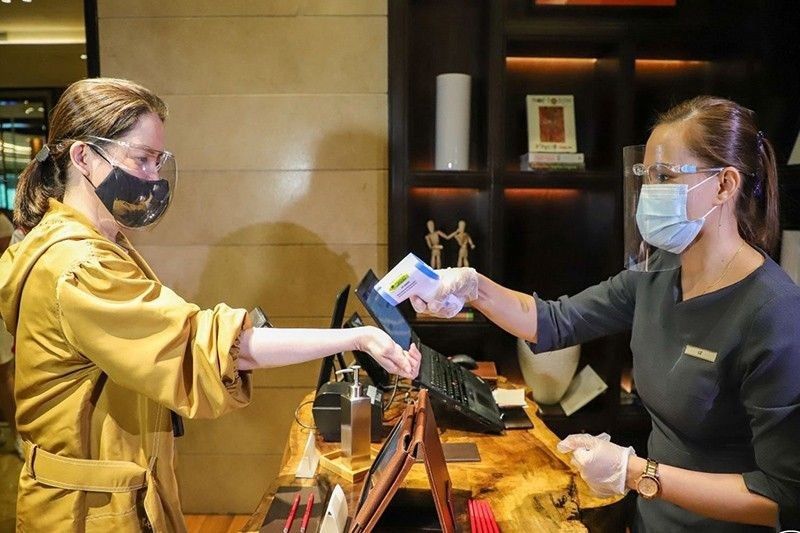Puyat to ‘staycation’ hotels: Follow guidelines

MANILA, Philippines — Hotels given the green light to operate for “staycation” purposes were reminded yesterday to follow the guidelines set by the Department of Tourism (DOT) to ensure a memorable and safe accommodation of guests during the pandemic.
“While we all long for a little bit of fun with the family, it is the responsibility of hotel operators to make sure that the health and safety of their guests and employees are not compromised,” said Tourism Secretary Bernadette Romulo-Puyat.
Under DOT Administrative Order 2020-006-A, the “Amended Guidelines on the Operations of Accommodation Establishments for Staycation Purposes under a General Community Quarantine,” all accommodation establishments in areas declared to be under GCQ must secure a certificate of authority to operate for staycations (CAOS) from the DOT prior to booking any guests.
At present there are 10 star-rated hotels in Metro Manila that have secured the new CAOS, said Puyat.
These are Grand Hyatt, Makati Shangri-La, Okada, Shangri-La at the Fort, Nobu Hotel City of Dreams (COD), Joy Nostalg Hotel and Suites, EDSA Shangri La, Solaire, Hyatt Regency COD and Nuwa COD.
Under the guidelines, accommodation establishments must follow protocols on guest handling, including the maximum number of guests per room, as well as health and safety standards for ancillary establishments.
They may also resume operations of ancillary facilities such as gyms, swimming pools, restaurants and other food and beverage outlets, except for bars which remain prohibited in GCQ areas.
“As safety remains the DOT’s top priority, establishments that will offer staycation services will be strictly monitored. They will be required to keep a record of occupancy and submit it every 10th of the month to the relevant DOT regional office and local government unit (LGU) tourism office for data analysis purposes,” Puyat said.
Guests of all ages will be allowed to go on staycation. In addition, a staycation guest shall be required to present a negative result from a rapid antigen test conducted on the same day of check-in.
The guidelines also stress that contactless and cashless transactions for taking bookings and payments are mandatory, to promote minimal physical contact among staff and guests.
Establishments must also adhere to other issuances on health and safety standards from the Department of Trade and Industry (DTI) or Department of Health (DOH) as well as rules and regulations imposed by the LGU concerned.
“Violators shall suffer appropriate fines and fees, including revocation of DOT accreditation,” Puyat said.
Last Wednesday, Puyat inspected the Grand Hyatt Hotel in Bonifacio Global City to check health and safety protocols in place.
“We are moving forward. Safety is the most important part of staycation. We want to ensure that our guests are feeling absolutely safe when they come here,” Hyatt general manager Gottfried Bogensperger said.
“A lot of people living in NCR, they want to go out and have a sense of normalcy and staycation is nothing new. They’ve been doing it in Singapore, in Japan and it’s very safe,” Puyat said, emphasizing that health and safety protocols need to be in place.
The Inter-Agency Task Force for the Management of Emerging Infectious Diseases (IATF) approved the operation of hotels with CAOS upon the recommendation of the DOT to explore various ways in restarting tourism activities as the COVID-19 threat lingers.
The DOT has listed 28 star-rated hotels in Metro Manila, of which 16 are five-star and 12 are four-star.
It also amended its guidelines for staycation hotels to include those in GCQ areas outside Metro Manila with at least a three-star rating from the DOT.
“To ensure that the staycation quality standards for health and safety protocols are in place, only hotels outside of the National Capital Region with at least a three-star rating from the DOT can accept guests for staycation while hotels in Metro Manila should at least be four-star,” Puyat said.
The tourism sector is a key driver of the country’s economy, contributing 12.7 percent to the gross domestic product in 2019 and 13.5 percent to total employment with 5.7 million workers in the sector.
- Latest
- Trending





























